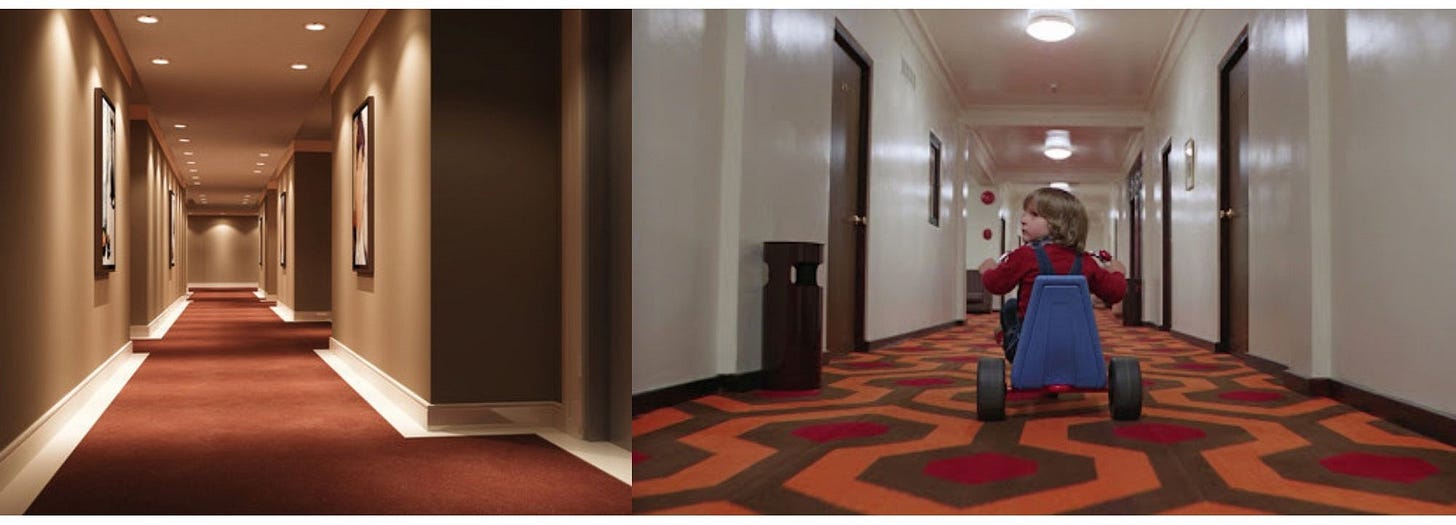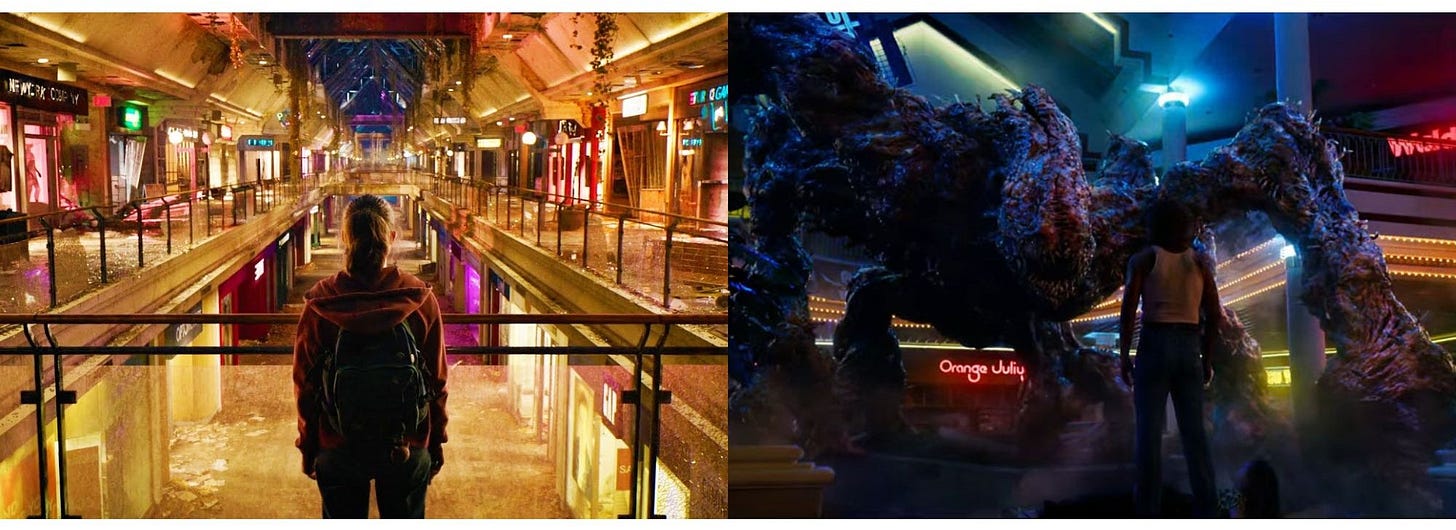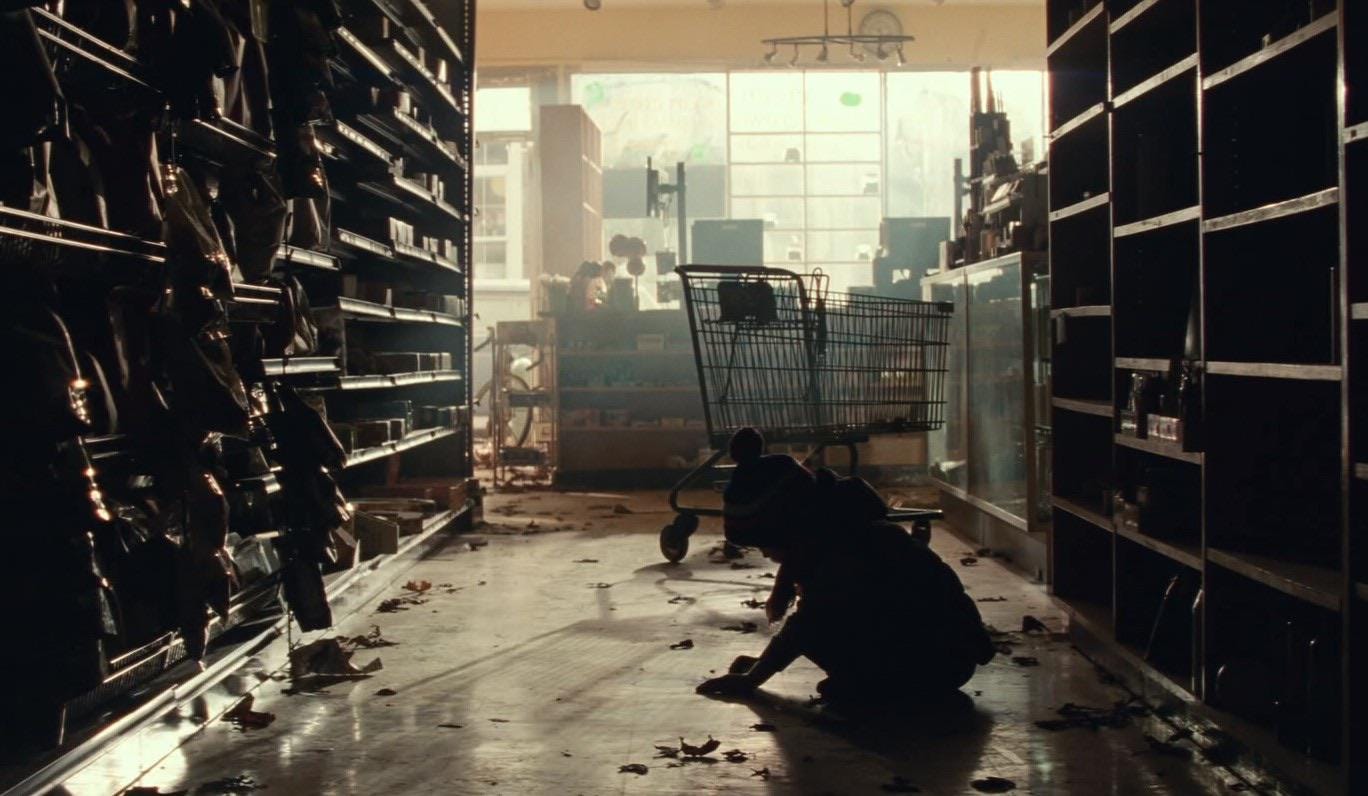The Liminality of Piranesi
Where we talk about The House in Piranesi and how liminal spaces work in literature
Recently, we discussed Piranesi by Susanna Clarke on The Novel Tea Podcast. The book is about a man who must find his way through a seemingly endless House with enormous statues, timely floods, and countless vestibules. His journey is disrupted when a Visitor introduces ideas and concepts that change his perspective permanently. In the story, the House represents a unique character with its immensity and complexity evoking a feeling of mysteriousness and vague familiarity. During our discussion on the podcast, Shruti and I had similar perceptions of what the House would look like. This got me thinking about how the House shaped the story of Piranesi as a whole.
Liminal Spaces
(this newsletter contains spoilers about Piranesi by Susanna Clarke)
A liminal space is an “in-between” space devoid of people that conveys the mood of eeriness, sadness, or nostalgia. The best example would be a hotel corridor - all hotel corridors share similar characteristics (narrow spaces, windowless, patterned carpets & endless doors), and thus all feel somewhat familiar. This familiarity can be unsettling because the space feels unknown, isolated, and uncomfortable. In literature and media, the idea of liminal spaces is used to evoke a feeling or set a mood.

Another example of liminal spaces in media is abandoned malls. The idea that this mall was once a place with bustling people, loud voices, and recreation creates a saddened or surprised emotion. It begs the question “What happened here?” The absence of human connection shows the social aspect of liminality and how the memory of people, or the lack of humanity can affect how the space feels.

In my interpretation of Piranesi, the House is a state of Piranesi’s mind - a kind of transitional safety bubble between reality and his subconscious. The contrast between the lack of other humans and the presence of these enormous looming statues only emphasizes the loneliness and isolation of the House and the fact that Piranesi is on his own. The descriptions of the clouds, the tides, and the proportions of the vestibules show how surreal and impossible the space is.
“In my mind are all the tides, their seasons, their ebbs and their flows. In my mind are all the halls, the endless procession of them, the intricate pathways. When this world becomes too much for me, when I grow tired of the noise and the dirt and the people, I close my eyes and I name a particular vestibule to myself; then I name a hall.”
— Susanna Clarke, Piranesi
In Piranesi's mind, the liminality of space also acts as a metaphor. His forgetfulness and lack of memory add to the surreal effect of his journey, and the fact that he is subconsciously neither here nor there mirrors the transitional exploration of his mind.
Physically, the House is described as being laid out in an endless array of vestibules with no living spaces. In someone’s home, a vestibule is a temporary space that acts as an intermediate area between an entrance or exit and someone’s home. If Piranesi’s way out of the House is through the front door, and his mind is his home, then the House acts as that temporary in-between space.
Piranesi’s childlike tendencies and love for exploration are some of our favorite aspects of the book. His personality parallels this idea of liminality, where Piranesi's character creates an atmosphere of yearning for youth or a pleasant remembrance of childhood. I also love the idea of Susanna Clarke breaking the fourth wall and wanting readers to find nostalgia in the House by mentioning the statue that reminds us of Mr. Tumnus from the Chronicles of Narnia.
In the examples I’ve used (The Shining, a literal horror story, and The Last of Us, a post-apocalyptic zombie scenario), I think it’s easy to misunderstand liminality as being negative. Most of the descriptive words I’ve used to describe liminality are longing, eeriness, unsettling, or unease. So how can it be something positive?
I recently read Dark Matter by Blake Crouch and then immediately binge-watched the Apple TV series based on the book. It is about a professor named Jason Dessen who is abducted by a mysterious stranger. He struggles to find his way back to his family and discovers a disorienting space separate from the real world called The Box.
The Box is physically, mentally, and emotionally a liminal space. Its dark colors and seemingly endless hallway with doors have a similar concept to the hotel corridor example we saw in The Shining. The Box is supposed to be scary (and it is), but it’s not a bad thing either. It’s a space that creates endless possibilities and can be interpreted as an opportunity.
Similarly, I think The House in Piranesi plays with your mind with its physical description. Shruti and I had similar visual ideas of what the House might look like, and I especially loved these images created by Beatrice Woodward. You can view her full gallery here.
The House is bright, full of nature, and the perfect place for exploration. But it is also a prison. It was my understanding that The House represented a place where Piranesi felt safe, so it makes sense for it to be somewhat welcoming and aesthetically pleasing. However, it is not a place that Piranesi can run away to forever, and in the end, he must face reality and exit The House for his own good.
Liminality is a super interesting topic in terms of how we use it in literature and media. Things that you know, like a supermarket or a library, can be transformed into a message or hint for you to follow. The supermarket in the beginning part of A Quiet Place is a great example of this. It can confuse you, surprise you, and make you happy or sad by playing games with your mind.
Here are some articles that explain and talk about Liminal Space that I thought were interesting:
—Neha
Up Next
Last week, we released our Season 3 Wrap! In this episode, we talked all about the books we’ve read this season, got into the literary vs. genre fiction debate, and shared even more speculative fiction book recommendations! Next week, we will be releasing a Mid-Year Reading Spotlight episode, where we talk about some of the books we have read off the podcast and put them into superlative categories. The episode will come out on July 10th, 2024.
We may be done with our season 3 book discussions on the podcast and our newsletter, but stay tuned because we will still be releasing weekly newsletters on everything speculatively related to our theme ‘Other Worlds’!








learned something new today. I don’t think i ever heard about liminality before but great analysis!
I recently finished Dark Matter and my mind immediately went to the show with this discussion of liminality. I think it's the perfect contrast to how I imagined the lightness of Piranesi.